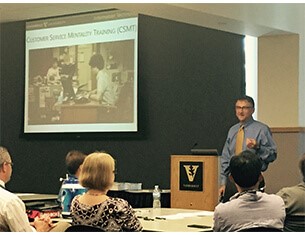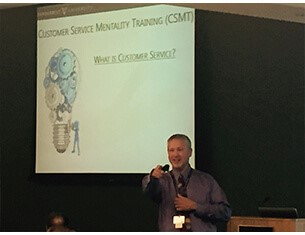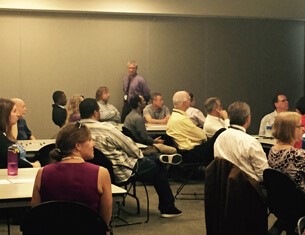VUIT team members reflect on Customer Service Mentality Training sessions as helpful, valuable
In 2015, 100 percent of Vanderbilt IT staff attended a Customer Service Mentality Training session dedicated to providing customers high-quality service as both individuals and as an organization this summer. The 12 sessions, run by Robert Hullett, featured team building exercises, case studies, and informational slides.
To emphasize his commitment to this initiative, Vice Chancellor John Lutz introduced each session and stressed the significance of developing a mentality of customer service.
"No matter what duties an employee's job entails, all of us are customer-facing to some degree," Lutz said. "With this program, I hoped to share some of the best client-focused skills and practices I have seen so that our team would have more tools in their toolboxes."

The stories and tips Lutz shared clustered on four thoughts about client service mentality: understanding agendas, preparing well, being a VUIT representative, and establishing rhythm. Hullett highlighted each of these throughout the rest of the class.
While some noted in feedback forms that the course could have included refreshments or was a bit too long, an overwhelming majority of staff members found the program to be valuable with nearly 90 percent sending in positive feedback.
“I thought that it was one of the best internal training classes I have personally attended,” said Darryl Boone, senior director of Core Infrastructure. “It was fast-paced and applicable, and the scenarios in the case studies were very helpful.”
Boone especially enjoyed the case studies because they were real examples of how IT could shift its viewpoint to recognizing customer issues as opportunities to serve, he said.
Even those more skilled in customer service due to their daily responsibilities gained new insights from the course.
For example, Lane Reams, manager of Network Design and Engineering, initially thought that the class would be a refresher since he considers his team to typically do a good job serving the customer. However, an incident proved that the course did much more than simply refresh old skills—it offered a new perspective on understanding customers’ needs before jumping in to fix the problem.
During the first week of August, Reams overheard an engineer on his team working with an irate customer. After learning about the customer’s problem, the engineer realized he needed to make a handoff to another team, and his highest priority was making sure that this handoff was clean for the customer because it was the “customer service mentality way of helping users,” Reams said.
“The course helped us rethink customer service and understand the true value of taking customer service to the next level,” he said.
Similar to Reams, Distributed Technology Services’ Betsy Ames spends most of her days supporting the customer directly and expected the class to simply be a review.
“This mostly served as a reminder of what we already should be doing,” Ames said. “But I was pleased with the emphasis on the fact that our ‘customers’ are not just people we serve outside of VUIT, but also our co-workers in other areas—along with anyone who calls on us for assistance from anywhere in the university.”
Boone agreed with Ames on the importance of taking ownership of the problem and claimed this concept as his biggest takeaway from the training session.
“Even if it isn’t in your area, we should own the issue to reach a resolution more quickly,” he said. “The easy thing to do is say that it’s not my problem—but the more challenging thing to do is to find the right owner and make sure that the customer walks away with a solution.”
Since 2015, Customer Service Mentality Training has become a foundational course for new VUIT team members.

